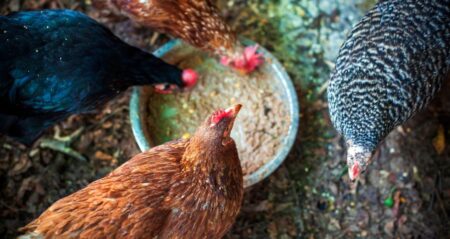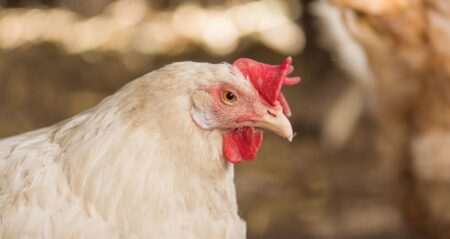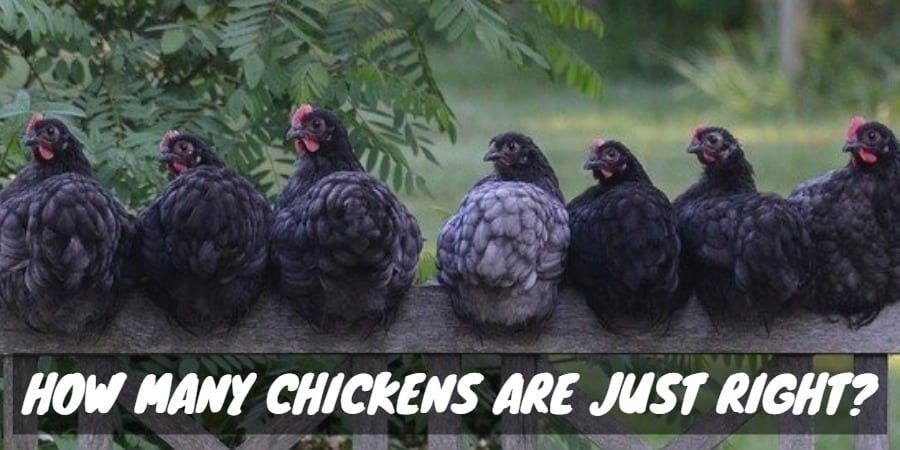Your chicken is not eating?
That is not good!
Let’s explore what could be causing her sudden loss of appetite and what to do about it.

What is Causing my Chicken to Stop Eating?
Unlike people, chickens don’t stop eating something because they are bored with the taste of it.
Usually, a chicken with a loss of appetite is an indication of a much larger problem.
The only exception to that rule is if you have a broody hen, if you chicken is ready to become a momma or has decided she will be broody even in the absence of a rooster, she will have a marked reduction in how often she eats.
So, if it is not maternal instincts, why is your chicken not eating?
Look For Signs of Illness
One of the benefits of small scale chicken ownership is becoming familiar with the ins and outs of your chickens, learning their habits and their personalities.
The more time you spend with your flock the happier you will be, this is scientifically proven, and the better you will be at noticing signs of illness.
Things to look for:
- hiding
- lethargy
- loss of appetite
- pale comb or change in comb colour
- unusual poop
Any of the above are good indicators that something is wrong with your hen but a loss of appetite is a serious problem – it could be a sick chicken.
How Do I Know if My Hen is Eating Less?
Chickens should eat, on average, a quarter pound of feed in a day.
Chickens will forage and eat almost constantly throughout the day.
If you notice that you are going through feed at a slower rate or your hen is seen “resting” for longer and longer periods, it is a good indicator that she is not eating as much as she should be and you need to take action.
Another good indicator is a reduction in egg output.
What Should I Do if my Hen Stops Eating?
The first thing you should do is separate your hen to a dark and quiet space. This is not only for the benefit of the affected hen but also to protect the flock should your chicken be sick.
After you’ve removed your hen there are a few things that you should do to check for illness and to encourage her appetite:
Check for Injury or Illness
The first step is always to check for injury or illness.
Look your hen over for any abrasions, for mites or evidence of lice, feel their crop to see if it is soft (a squishy crop combined with a sour smell on your hens breath could be an indication of sour crop also known as candidiasis) and give your chicken a body assessment.
What is a body assessment?
If you suspect your hen hasn’t been eating or is ill you should always evaluate the wellbeing of your chicken by assessing their overall body condition.
Chickens are stoic animals and will do their absolute best to hide any illness or injury usually until it’s too late (probably because chickens can be aggressive and will pick on or ostracize a sick member of the flock for overall flock security).
If your hen is noticeably thin or has bald patches you may be fighting a losing battle and it may be best to humanely dispatch your bird.
Encouraging Your Hen To Eat
After you’ve identified the problem, the best solution is to start encouraging your hen to eat nutrient rich foods.
Allowing your hen to relax in a quiet space with dim lighting and access to food and drink are the best ways to encourage your hen to eat.
The next is to offer tempting food.
Scrambled eggs, garlic, meal worms, fruit, yogurt and water are all great options for encouraging eating.

Other Reasons Your Hen Might Not Be Eating
Illness isn’t the only reason a chicken will stop eating (though it is the most common and the most pressing when it comes to coming up with a solution).
- Bullying
As you grow your flock you will probably notice that the term pecking order is very aptly named and is common in a flock.
Bullying is more common in mixed breed flocks where more aggressive breeds are kept with more timid chickens. Bullying can lead to chickens not allowing other hens to eat and thus your chicken becomes weaker and in need of attention.
There are a number of ways to stop bullying including things like chicken peeps and separating the flocks, what we’ve done is to provide more access points for food.
- Impacted or Sour Crop
Impacted crop happens when something gets lodged toward the bottom of a chickens crop causing a blockage which doesn’t allow food to pass properly into the digestive system of the chicken.
Because impacted crop is painful and literally is a full “stomach” a chicken will stop eating.
Impacted crops can become sour crop if left untreated and eventually death.
- Egg Bound Hen
If your chicken hasn’t laid an egg in a few days and seems more uncomfortable than usual they may be egg bound.
That means that the egg is stuck in the chicken, this is a fatal condition and must be alleviated as soon as possible because egg rupture in the hen will lead to death.
- Mites
You may not think that bugs can do a lot of damage and cause a loss in appetite but they most certainly can.
To check your hen for mites take a flashlight with you to the coop in the dark and check the base of her feathers and under her wings. If you notice what appears to be dust clinging to the base of the feather it’s very likely she has mites.
Take her in and wash with gentle dish soap, give her a cool place to rest and treat her with a mite spray (garlic and oregano is a natural option as is DE).
Remember: if you find mites on one chicken it is likely they are on all your chickens, clean your coop thoroughly and treat all chickens with a mite spray for one to two weeks.
Conclusion: What To Do If My Chicken Stops Eating
Don’t panic.
While not eating is very atypical for a chicken, it is not necessarily a death sentence.
Always separate your chicken so that you can do a thorough examination of her body condition and check for illness or injury.
If your chicken is in need of veterinary attention seek an expert, if they need to be given time to recover and rest than offer her tasty foods that are nutrient rich and give her a calm and quiet place to rest and a steady supply of food and water until she regains strength and can be reintroduced to the flock.




